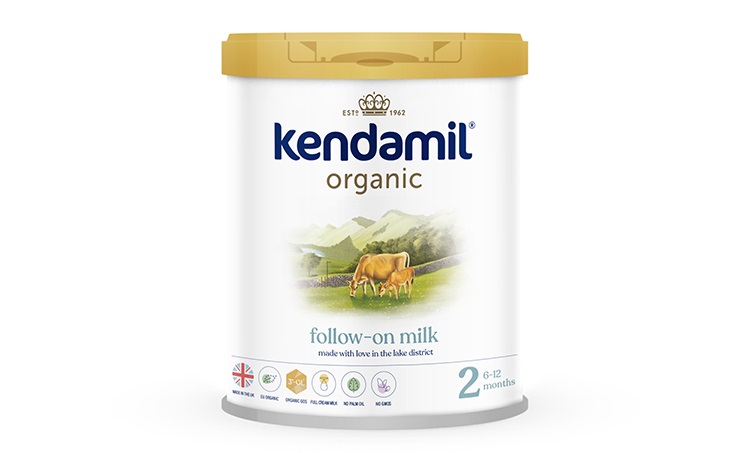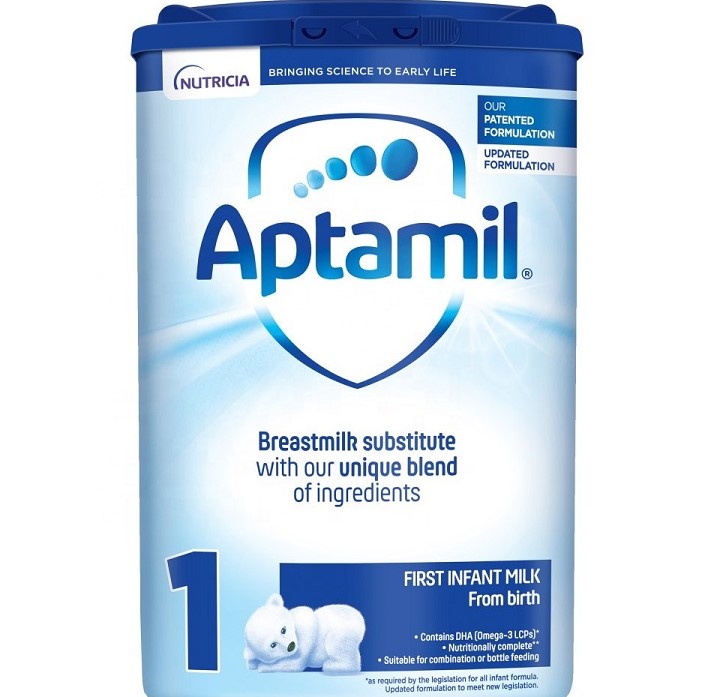In any store where baby formula is sold, you will find many different formula brands on the shelves in the formula section.
Sometimes making choices may seem complicated because we need clarification at the sight of the numerous formulas on the shelves.
You could find yourself asking questions like Kendamil vs Aptamil, and if you are not better informed about these two formulas, you could get confused, hence the need for a detailed comparison between these two.
Before we dive into that, one thing you need to know about these two formulas is that they contain essential nutrients for your baby’s growth.
However, one must choose from the two. One of the main differences between Kendamil vs Aptamil is that it uses whole milk with a high level of full cream nutrients, in contrast to cheap skimmed milk that must be supplemented with minerals and vitamins to resemble breast milk.
Table of Contents
- Kendamil Vs Aptamil – Features, Pros & Cons
- Kendamil Vs Aptamil – Similarities & Differences
- Kendamil Vs Aptamil – FAQs
- Final Thought
Kendamil Vs Aptamil – Features, Pros & Cons
As accredited by the European Commission, Kendamil vs Aptamil contain fortified minerals and vitamins that promote growth and prebiotics that promote good gut bacteria.
Strangely, they are priced differently, have different reviews, and have a slight difference in ingredients.
Let us look at their features, pros, and cons to see how they differ from each other.
Kendamil

This is one of the best, most nutritional, nutritious, and healthy formulas in the market, and to its credit, it is 100% Organic, has no palm oil, and contains only natural and healthy fats.
The product is obtained from a whole milk recipe and is manufactured using plant-based DHA and HMOs, which help grow and develop your little one’s immune system.
Additionally, it contains high levels of Milk Fat Globule Membrane (MFGM), which supports infant mental development.
Ingredients
| Organic skimmed milk | organic demineralized milk whey protein (whey protein unpacked ) powder |
| Vitamin K | Calcium Citrate |
| Biotin | Sodium Citrate |
| L – Carnitine | Organic galactooligosaccharides |
| Riboflavin | Vitamin C & E |
| Omega 6 & 3 | Vitamin B, B6, and B12 |
| Palmitic acid | Organic vegetable oils |
| Organic whole milk | Iron Pyrophosphate |
| Folic acid | Inositol and choline |
| Calcium lactate | Magnesium chloride |
Features
- It is 100% Organic
- It has no palm oil
- It contains only natural and healthy fats.
- It is non-allergic and Vegetarian friendly
- It uses organic whole milk
- Uses lactose as a carbohydrate source
- It contains vitamins and minerals
- It uses natural full cream cow milk fat
Pros
- It is free of gluten and soy
- It is vegetarian friendly
- It is organic
- It has a long shelf life
- It has a recyclable metallic tin
- Has high infant acceptance
- It is natural and healthy as it has no palm oil
- Has prebiotics for better digestion
- It has a creamy texture
- It has a luscious smell and a great taste
- It uses natural full cream cow milk fat to reduce the need for higher vegetable oil amounts.
Cons
- It lacks probiotics
- Milk products may be allergic to some infants
- There are chances of constipation
- It can be too bubbly
Read Also: Enfamil vs Kendamil
Aptamil

This is one baby formula that has to its credit many years spent in an infant’s early life research and the knowledge gained used in its manufacture.
Manufacturers of this product claim that 50 years of research inspired the manufacturing process of this nutritionally rich infant formula.
Aptamil formula is a nutritionally complete formula that can be used solely as your baby’s milk source or in combination with breast milk to serve as a top-up.
The product is also environmentally friendly and has many positive reviews; as a result, it is sought after globally.
It is suitable from birth and as part of a weaning diet from 6 months.
Ingredients
| Vegetable oils | Demineralized whey milk |
| Lactose | Galactooligosaccharides (GOS) – obtained from milk |
| Skimmed milk | Fructo-oligosaccharides (FOS) |
| Whey protein concentrate | Potassium Citrate |
| Calcium carbonate | Potassium chloride |
| Fish oil | Magnesium chloride |
| Calcium phosphate | Vitamin C |
| Emulsifier (soya lecithin) | Choline chloride |
| Vitamin K1 | Taurine |
| Sodium selenite | Ferrous sulfate |
| L-tryptophan | Zinc sulfate |
| Biotin | Cytidine-5-monophosphate |
| Vitamin B12 | L-carnitine |
| Guanosine-5-monophosphate sodium salt | Inosine-5-monophosphate sodium salt |
| Vitamin B6 | Vitamin A & E |
| Uridine | Adenosine-5-monophosphate |
| 5-monophosphate sodium salt | Pantothenic acid |
| Thiamin | Vitamin D3 |
| Manganese sulfate | Folic acid |
| Potassium iodide | Copper sulfate |
| Nicotinamide | Inositol |
Remember that ingredients may vary from stage to stage and with time.
Features
- Contains DHA that supports baby’s normal brain development
- Nutritionally complete
- It can serve as a milk substitute
- Some of their products support the dietary requirements of babies diagnosed with colic, reflux, and cow’s milk allergy.
- It has a unique taste that can entice your baby’s taste bud
- It contains Iron and folic acid
- Contains nucleotides
- It promotes the growth of healthy bacteria
- It contains probiotics and prebiotics
- It has galactooligosaccharides (GOS) and fructooligosaccharides (FOS)
- Supports gut bacteria
- Contains Whey protein
- Contains DHA/ARA
- Discourages the growth of harmful bacteria
- Contains vitamins
Pros
- It promotes the growth of healthy bacteria
- It contains probiotics and prebiotics
- It is Easy to digest
- It is gluten-free
- Some are Non-GMO while some variants are GMO
- Helps with colic
- You can get them cheaply in sachets
Cons
- It is expensive compared to other formula brands
- Can make your baby gassy
- There are chances of clumping
- It has fish oil that may be allergic and vegan unfriendly
- It contains palm-reduces calcium and fat absorption
Read Also: Nan vs Aptamil
Kendamil Vs Aptamil – Similarities & Differences
Similarities
- The use of Kendamil and Aptamil as baby’s formula has the approval of the most stringent regulating body, the European Commission.
- Both products contain fortified minerals for better growth.
- Both contain vitamins for the effective development of your child
- Both contain prebiotics used in their manufacture for the aid of beneficial gut bacteria
Differences
- In manufacturing Kendamil formulas, the manufacturers use only prebiotics, while the manufacturers of Aptamil formula either use prebiotics or a combination of prebiotics and probiotics in manufacturing their products.
- While Kendamil contains only organic galactooligosaccharides as fiber for the probiotic, Aptamil contains both galactooligosaccharides (GOS) and fructooligosaccharides (FOS).
- The manufacture of Kendamil utilizes DHA-rich Algal oil from the wet biomass, thus avoiding the use of most vegetable oil. In contrast, Aptamil does not use DHA-rich Algal oil from the wet biomass.
- Kendamil uses a special blend of vegetable oil made of sunflower, coconut, and canola oil (it improves calcium absorption and reduces soap formation in the gut). In contrast, Aptamil uses a blend of Palm oil, Coconut oil, Rapeseed oil, High Oleic Sunflower oil, and Sunflower oil.
- Kendamil has a range of strictly organic products, whereas Aptamil has organic and non-organic products.
- Kendamil is a non-GMO ingredient-based product line, whereas its counterpart Aptamil is not strictly non-GMO because corn is utilized in producing some of her products.
- Kendamil lacks diary based blend that has partial fermentation, while Aptamil contains diary based blend with a fermentation rate of about 29%
- The producers of Kendamil use palmitic acid, an ingredient popular for its high calcium absorption rate. It enhances digestibility and fat absorption and minimizes constipation, whereas the use of such ingredient is lacking in Aptamil.
- Unlike its competitors, Kendamil uses whole milk with the highest amounts of full cream nutrients instead of cheaper skimmed milk, which requires mineral and vitamin additions to mimic breast milk.
Read Also: SMA comfort vs Aptamil comfort
Kendamil Vs Aptamil – FAQs
What formula is similar to Kendamil?
Regarding composition, Kendamil’s classic first infant milk is similar to most U.S. formulas.
This includes ByHeart, Enfamil Enspire, Enfamil NeuroPro, Similac 360 Total Care, Similac Pro-Advance, generic Advantage/Advantage Premium, Kirkland Pro-Care, and generic Infant!
Does Kendamil make babies sleep?
Parents who switched to Kendamil reported their babies are more energetic and seem happier. They sleep soundly and often right during nighttime.
Can I breastfeed and give the baby formula?
The answer is Yes. You can combine breastfeeding and formula. Pairing the two is called supplementing, and people use these routes out of necessity, convenience, or subjective preference.
Do babies sleep longer when formula fed?
Formula, unlike breast milk, takes longer to digest, so babies who are fed formula sleep longer and tend to wake less than those who are nursed.
Related Posts:
Final Thought
Hopefully, this article has answered your question on Kendamil vs Aptamil. There are different people with different tastes, and variety, they say, is the spice of nature.
Both products are nutritionally complete and rich but with variations in their manufacture, and it is these differences that make them unique.
Nevertheless, there has been a significant shift to organic products recently. It is no surprise that more and more parents are choosing organic baby formula since it is safe, environmentally friendly, tasty, and does not cause colic in babies.
In this contest kendamil vs aptamil, in terms of their nutritional content, Kendamil is the best choice since it contains organically sourced ingredients with palm oil absent, and it lacks soy products. Your baby will grow healthy, safe, nutritious, and tasty with this formula.
Aptamil, on the other hand, has good packaging, prebiotics, and probiotics for better digestion. It contains lactose and a partially fermented dairy blend, but it is still no match for the Kendamil organic product line.
